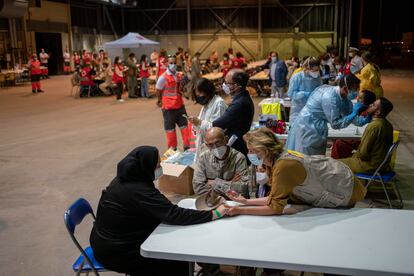Aircraft carrying 48 Afghans, five Spaniards arrives in Madrid from Kabul
Spain has so far sent three A400M military planes to carry out the repatriation operation. Two will be used to transport the evacuees, while the third is to provide medical care


The first flight from Kabul carrying Afghan refugees and staff from Spain’s embassy in Afghanistan landed today at 4.30am in the Madrid air base of Torrejón de Ardoz. There were 53 people on board, five of whom were Spanish. The remainder were Afghans who have worked for the Spanish government in recent years as well as their families. Among the refugees were a dozen or so children.
Upon leaving the plane, the passengers were directed to a hangar where doctors and nurses were waiting to carry out coronavirus antigen tests. The refugees were expected to be registered and to then request asylum. They were also due to remain in the air base during the first 72 hours, before being sent to different shelters in the Spanish state network, or in the case of families, state apartments.

So far, Spain has sent three A400M military aircraft to carry out the repatriation operation. Two will be used to transport the evacuees, while the third is a medical plane. All three aircraft left Spain earlier this week headed first for Dubai, from where they will be flying to Kabul.
Foreign Minister Juan Manuel Albares and Inclusion, Social Security and Migration Minister José Luis Escrivá were on hand to welcome the arrivals at the runway on Thursday morning. Albares commented later that there were very few Spaniards left in Afghanistan, which has been taken over by the Taliban in recent days in the wake of the withdrawal of United States troops. Only the Spanish ambassador and a handful of civil servants are left.
We will do everything possible to bring all Afghan translators and collaborators to SpainForeign Minister Juan Manuel Albares
“Only the essential personnel needed to coordinate the evacuation of the Afghan collaborators who remain,” said the minister, regarding who was still on the ground in the capital Kabul.
Without giving figures, numbers nor locations for security reasons, Albares explained that the Spanish government was doing “everything possible” to bring all of those people who have worked with the authorities to Spain. But the task is not an easy one. There are Afghan translators and collaborators who are currently in hiding and have not been able to reach the airport. “We do not control the Kabul airport, which has become a genuine bottleneck,” the minister continued. “But we will do everything possible to bring them all to Spain.” Some sources have put the number of people in question as high as 500 or 600.
Minister Escrivá, for his part, explained that the refugees will be under the guardianship of the state for at least six months, that they will be taught Spanish and “helped to integrate” into society. “After the first few hours, we will carry out detailed profiles of each refugee with the aim of facilitating their integration.”
While the ministers were speaking, in the hangar the refugees – among whom was a woman wearing a burka – were being given their coronavirus tests. When they had a moment, they were taking a first look – some of them clearly dazed and exhausted by their journey – at the country in which they will be living from now on.
Operation to locate Afghan collaborators
A total of 17 officers from the GEO special operations group and the National Police UIP riot unit are in charge of locating the Afghan collaborators who worked with the Spanish army and the diplomatic delegation in the country in order to evacuate them from Kabul. The officers account for the entire security staff at the Spanish embassy in the Afghan capital.
“They call them, they send them to a safe point in the city, they collect them, take them to a safe area at the airport, around six kilometers from the airport, and they transfer them and hand them over to members of the Spanish army when the plane arrives,” sources from the operation explained.
So far, 53 Afghan collaborators – 16 of whom worked in the Spanish embassy – left on the first military plane sent by Spain on Wednesday.
Both the police officers and the diplomatic staff were reportedly still in the safe area near the airport on Wednesday. The officers “have spent three days working non-stop to locate the people who have worked together with the Spanish civil servants,” the same sources reported, adding that the situation was “completely chaotic,” something that has been making their work more complicated – both in terms of their own security and that of the people they are trying to evacuate.
With reporting by Patricia Ortega Dolz.
English version by Simon Hunter.
Tu suscripción se está usando en otro dispositivo
¿Quieres añadir otro usuario a tu suscripción?
Si continúas leyendo en este dispositivo, no se podrá leer en el otro.
FlechaTu suscripción se está usando en otro dispositivo y solo puedes acceder a EL PAÍS desde un dispositivo a la vez.
Si quieres compartir tu cuenta, cambia tu suscripción a la modalidad Premium, así podrás añadir otro usuario. Cada uno accederá con su propia cuenta de email, lo que os permitirá personalizar vuestra experiencia en EL PAÍS.
¿Tienes una suscripción de empresa? Accede aquí para contratar más cuentas.
En el caso de no saber quién está usando tu cuenta, te recomendamos cambiar tu contraseña aquí.
Si decides continuar compartiendo tu cuenta, este mensaje se mostrará en tu dispositivo y en el de la otra persona que está usando tu cuenta de forma indefinida, afectando a tu experiencia de lectura. Puedes consultar aquí los términos y condiciones de la suscripción digital.








































